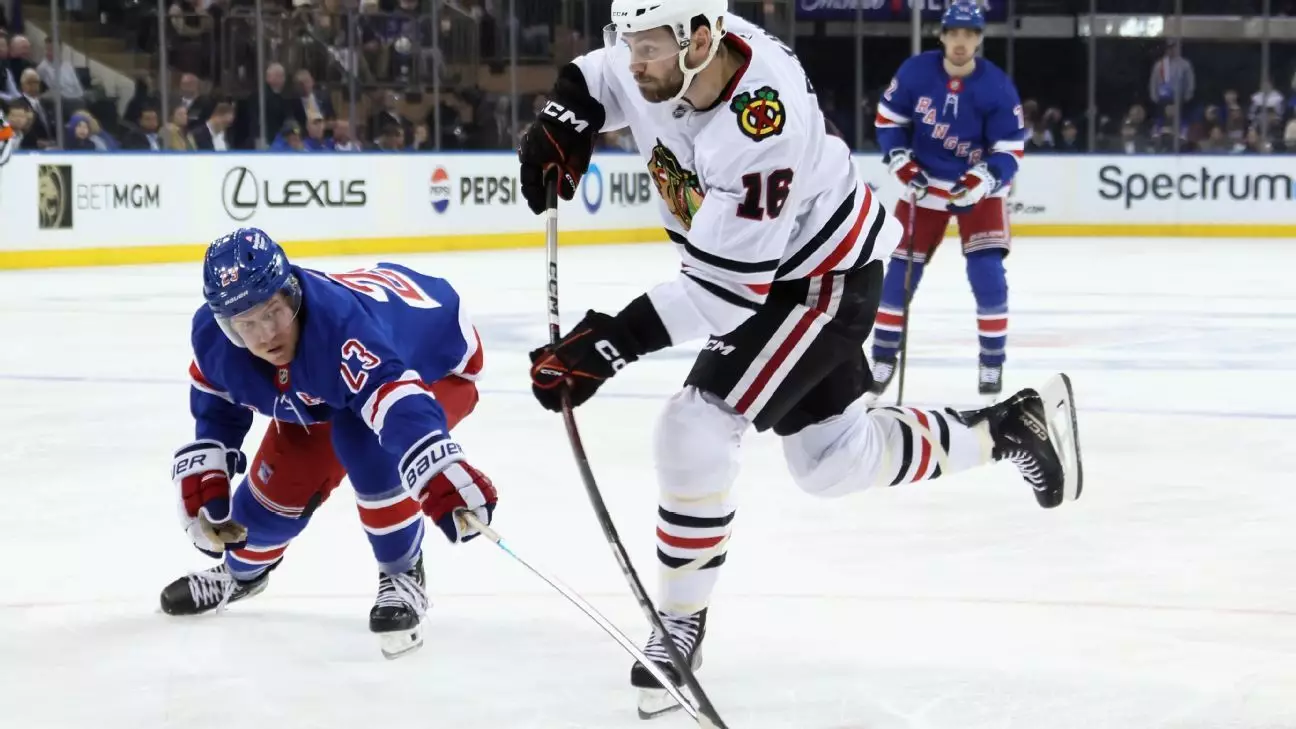The New York Rangers, who were celebrated as the NHL’s leading team last season, now find themselves grappling with significant challenges just a month into the new season. Currently, they sit somewhere in the middle of the standings, plagued by a disheartening downward spiral that has seen them accumulate eight losses in their last ten games. This period of struggling has been exacerbated by recent roster changes, including the shocking trade of captain Jacob Trouba to the Anaheim Ducks. The fallout from this trade has been evident on the ice, highlighted by a disappointing 2-1 defeat at Madison Square Garden against the struggling Chicago Blackhawks—the worst team in the league.
The move to trade Trouba, known for his physicality and leadership, left the Rangers not only with a hole in their defense but also a leadership vacuum. The departure of such a pivotal player has ramifications beyond sheer statistics; it alters team dynamics and morale. After the loss to the Blackhawks, player Artemi Panarin was candid in expressing the team’s dissatisfaction with their present performance, admitting that the atmosphere was not welcoming, especially considering the crowd’s frustration that manifested in audible boos. This sentiment underscores a critical issue for the Rangers—a need for resilience and recovery amidst adversity.
Despite firing 30 shots on goal, the Rangers struggled substantially in that game against the Blackhawks. Their lone score came from a short-handed opportunity by Will Cuylle while facing backup goalie Arvid Soderblom, whose previous season record had raised questions about his viability as a starter. The Rangers’ inability to capitalize against a less experienced netminder compounds their struggles, particularly as they had recently squandered a lead against Philadelphia’s Philipp Grubauer as well. Coach Peter Laviolette’s post-game remarks reflect a coach deeply concerned about execution and fundamentals, hinting at possible fatigue or mental blocks impacting player performance.
From an optimistic start with a 12-4-1 record, the Rangers’ turnaround raises questions about their strategy as the season progresses. They’ve experienced a drastic slum since their last victory on November 19 against the Vancouver Canucks, marking a stark contrast to their glowing start. The absence of Trouba has clearly hampered their defensive efforts, and without a physical player to anchor that unit, they seem to struggle against teams that effectively capitalize on their weaknesses.
Goalie Igor Shesterkin, who recently received a hefty contract extension, has faced scrutiny of his own. With a record of 9-10-1 that includes a disheartening stretch of six losses across seven outings, his performance must improve. The stakes are high for a player of his caliber, and the Rangers will need him to jaw-droppingly raise his game if they are to shift back to a position of strength in the league.
As they prepare for upcoming games against Buffalo and a home encounter with the Los Angeles Kings, the Rangers face the critical need to rebuild and refocus. Chris Kreider’s voice as an experienced forward resonates as he stresses the importance of regaining a work ethic that matches their ambitions. The leadership on the team—a responsibility that now falls on the remaining senior players—will have to be palpable if the team hopes to climb back into playoff contention.
This transitional period could either make or break the Rangers. The team’s ability to adapt, to find a unified approach with fresh leadership dynamics, and to execute plays effectively will determine their future trajectory in the NHL. As they rally in the coming games, the question remains: can the New York Rangers reclaim their status as a top contender, or will this season mark a turning point of disappointment?

